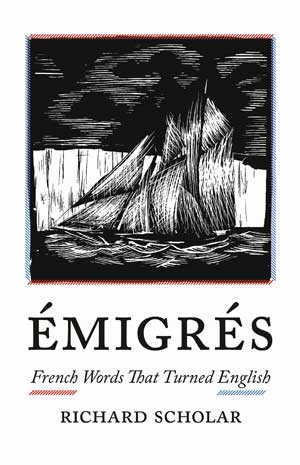
George W. Bush is said to have claimed that “the problem with the French is that they don’t have a word for entrepreneur.” Whether or not it is true, that anecdote illustrates a deeper truth, which is that many in the English-speaking world turn to French more than they would like to think they do.
English has borrowed more words from French than from any other modern foreign language. Many borrowings from French have been seamlessly absorbed into English, like the word entrepreneur. They’ve become part of the fixtures and fittings. Other French borrowings in English leave no room for confusion about their provenance. They assert their identity as French migrants—as émigrés. Think of phrases like je ne sais quoi and à la mode. Phrases such as these and words like naïveté, ennui, and caprice have been widely available in English since the later part of the seventeenth century. They have struck many speakers and writers of English as being uniquely expressive. What role, I wanted to ask, have émigrés played in the making of modern English as it has developed over centuries and as it is spoken and written all over the world today?
Émigrés is my answer to that question.
The book explores the emergence in Restoration English of particular émigré words and phrases. It traces the later trajectories of these words across the English-speaking world. It reveals how such émigrés inspire receptivity in some Anglophones, resistance in others, and ambivalence in most. It shows how they can occasion extraordinary creativity even as they remain visibly caught up in a power relation between neighboring cultures—English- and French-speaking—that is never perceived as equal. Moving from opera to ice cream, the book shows how migrant French words are never the same again for having ventured abroad, and how they take on new lives in the material and visual cultures of the English-speaking world.
French migrant words fascinate me as a writer above all, perhaps, because they seem to complete English as a language by elegantly recalling its fundamental incompleteness. They reveal its relation to the languages that surround it. They mark out things it cannot immediately express while also creating for it new possibilities of expression. And it is above all in the myriad of practices we call literature that we see these possibilities of expression variously realized.

I have long been struck by how much and how deeply English borrows from French. My training was in French and English literature. My first book explored the literary and philosophical history of a single French phrase, the je-ne-sais-quoi, which names—in English as much as in French—a certain something in people or things that we struggle to explain. Working on that phrase up close alerted me to the wider role that French words play in English. I have been wanting to write this book ever since.
The conception of Émigrés owes much (and more than might be imagined) to a 2005 piece in the London Review of Books, by Jenny Diski. Responding to my study of the je-ne-sais-quoi, Diski wrote about the je-ne-sais-quoi she had first encountered as a young woman in 1960s London. Her piece brilliantly demonstrated, in a way I could not have anticipated, that the je-ne-sais-quoi was a modern keyword of a kind that the cultural critic Raymond Williams left underinvestigated.
Williams explored English words, complex in meaning, that relate to what he called ‘the central processes of our common life.’ Williams thinks about language in history and language as history. That was an inspiration to me. But I came to feel that Williams’s pioneering vocabulary of culture and society lacked an entire category, that is, keywords of conspicuously foreign derivation. No vocabulary of English would be complete without them. They include the many migrant French words that we users of English share as we talk about the central processes of our common life.
Perhaps the most surprising discovery in Émigrés, at least to me, was of the colonial histories lurking in the French words that have turned English. These histories may be traced right back to the Norman conquest of England—to 1066 and all that. They have profound implications for the questions we need to ask about our language. They show English being made by mixing with foreign words in a creolizing process connected to colonialism at home and abroad.
Creolization emerged as an important concept in the work of Caribbean intellectuals Édouard Glissant and Stuart Hall. They defined it as a mixing of languages and cultures that takes place amidst highly unequal relations of power such as, primarily, those that existed between African slaves and their European owners on plantations in the Caribbean. Creolization has yet fully to be considered for its shaping of cultural relations within Europe. I start to fill that gap in Émigrés and contribute to the development of creolization as a conceptual model. I examine the case of English and the cultures of the English-speaking world. I explore creolization for what it reveals of migrant French keywords, their controversial histories, and the complex uses to which they are put in the Anglosphere. I show that creolization is well placed to show how the long history of England as colonized and colonizer accompanies the development of English in its entangled relation to French.
I’d like readers to find their way to the book’s opening page. That page leads into the center of the book’s preoccupations by an indirect route, for it reveals an émigré word at work in the unlikely setting of Winnie-the-Pooh, A. A. Milne’s classic story for children of all ages. Bon-hommy is the French word. I show how it crackles with the energy of a literary work that, in a single sentence, reveals so much about English language and culture in its centuries-old, entangled, relation with French. Here is the page:
It is widely to be observed that those wishing, at little effort, to lend a certain intrigue to their English conversation season it with a certain je-ne-sais-quoi or some other soupçon of Gallic garniture. Even the introverted Eeyore, on occasion, reaches for the mot juste. Eeyore is the old grey donkey who lives in a corner of a field that is forever England in A. A. Milne’s stories about Winnie-the-Pooh and friends. In chapter 6 of Winnie-the-Pooh, it is Eeyore’s birthday, a fact that his friends have all forgotten. When Pooh Bear chances upon Eeyore and wishes him a good morning, Eeyore doubts that it is a good morning, hinting darkly: “We can’t all, and some of us don’t. That’s all there is to it.” Pooh asks Eeyore to explain. The old grey donkey offers the following list of equivalent words and phrases: “Gaiety. Song-and-dance. Here we go round the mulberry bush.” A puzzled Pooh asks, “What mulberry bush is that?”, in response to which the donkey merely continues his variations on the theme: “‘Bon-hommy’, went on Eeyore gloomily. ‘French word meaning bonhommy,’ he explained. ‘I’m not complaining, but There It Is.’”
Et voila?: There It Is, indeed, the French word that bursts into flower in the midst of the most English sentence. A word of conspicuously French derivation serves Eeyore’s purposes well. It would be too painful for him to name in plain English the simple happiness of being alive that the irrepressible Pooh clearly possesses that morning and which the old grey donkey can’t and doesn’t, at the best of times, but especially when it is his birthday and They have all Forgotten. Instead, Eeyore names obliquely the capacity for happiness that is denied him, alluding to popular English rhymes that speak of it and producing synonyms that name it. He brilliantly introduces the last of these synonyms, bon-hommy, as a French word possessing the meaning of the selfsame word in English. He thereby specifies that meaning as evident to the likes even of Pooh Bear, while using the Frenchness of the word to emphasize its distance from himself, the discontented grey English donkey. His single-word code mixing of French in English at once connects him to, and separates him from, French ways of saying and being.
Eeyore’s flourishing of bon-hommy is an act of expressive indirection that reveals much about the history of English in its centuries-old relation with French…
Words that cross languages and cultures are my subject. Why concern myself and readers with these? Such words matter to me, not as self-sufficient objects, but for the stories they tell of what it is to live a human life in history and for the role they play in the making of concepts, practices, and forms in and across cultures. I’m endlessly fascinated by these interactions, particularly as these are found in literature, which shapes and is shaped by language, of course, in unique ways.
I write not so much in defense as in illumination of French émigré words as they have been received and recycled—used, abused, and reused—in Anglophone culture. I treat the particular words I study in detail—words like caprice, naïveté, and ennui—as points of access into a wider exploration of the processes of translingual and transcultural migration in literature and its sister arts. This, then, is a book about translation and its other. Above all, however, it casts light on those untranslated French words that have ‘turned’ English in their movement between languages and their powers of cultural transformation.
We live at a time, of course, when many more English words are ‘turning’ French than the reverse. The historical reasons for this are obvious. After the British empire spread English across the world, the United States entrenched English as a global lingua franca, causing the unprecedented amount of lexical borrowing from English that is currently taking place in French and other languages. The response in the Francophone world to this process of Anglicization is an unresolved mixture of receptivity and resistance. It largely mirrors the Anglophone attitudes I explore in the book towards Frenchification.
What I want to suggest to my readers, above all, is that the current dominant position of English in relation to French ought not to be allowed to conceal a longer and more complex story of linguistic and cultural interaction. Anglophones have borrowed words from French for centuries. Why and how they do, and revealing what attitudes in the process towards French and the foreign, are questions at the heart of Émigrés.
To existing studies I bring an approach that is innovative, in that it yokes together keywords and creolization, two hitherto unrelated concepts in cultural criticism. When combined with due care, I contend, these concepts make unique sense of the processes that have entangled and enriched English and French language and culture in history. For they show untranslated French words not only ‘turning’ English, but making it anew, causing ambivalence and controversy in the process.
The result is an experiment in a cosmopolitan cultural criticism that is sensitive to language, to the vexed social and cultural questions that language raises, and to the dialogue between the arts.
I recognize that the book is, in many ways, a caprice. I will leave it to others to judge whether or not it is also a naïveté. Perhaps my greatest hope is that the book does not cause too much ennui.


Richard Scholar is Professor of French at Durham University, a Leverhulme Major Research Fellow, and the author of Émigrés: French Words That Turned English (2020). His other publications include The Je-Ne-Sais-Quoi in Early Modern Europe: Encounters with a Certain Something (2005) and Montaigne and the Art of Free-Thinking (2010). His work has appeared in several languages.